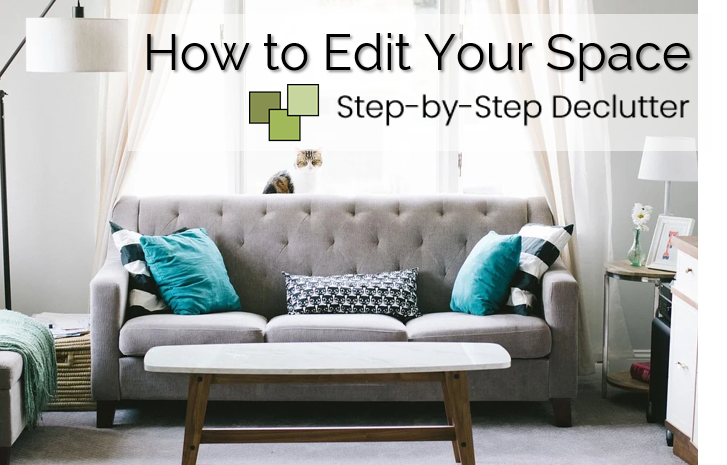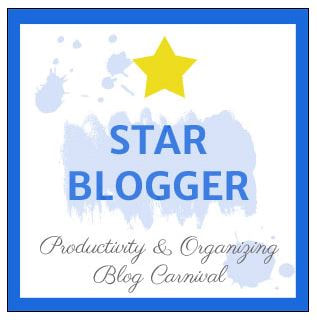|
|
|
My husband writes books, and I edit them. Editing can be a tedious task. It takes time and concentration to make a careful, deliberate review of the material. When I edit my husband's writing, I am looking for typos and grammatical errors (copy editing), but I am also evaluating the effectiveness of his argument and the fluidity of the text (content editing). I'm not just interested in whether his work is written properly; I'm interested in whether it is written well. I want it to be a true and compelling representation of his thoughts and ideas. It occurred to me recently that decluttering and downsizing are kind of like editing. In fact, the word edit can mean to expunge or eliminate [the unnecessary]. While this definition is highly appropriate to a discussion about removing clutter, I also like applying the more common (grammatical) definition of edit, which is to revise or correct. When we downsize and declutter, our goal shouldn't be limited to removing the excess, but also to setting things right in our environment (i.e. revising and correcting). To me, the ideal space is one that is a true reflection of its owner. Clutter has a way of crowding in and making itself at home, obsuring the purpose and personality of a space in the process. Editing a space allows us to revise its form and function so that it becomes a proper depiction of who we are, what we value, the road we've traveled, and how we like to live. When editing your own or someone else's writing, there are certain things you look for and eliminate in order to make the work the best it can be. The same is true for editing your space.
Mistakes in spelling, sentence structure, subject-verb agreement, and other common grammatical errors are the most obvious to search for and often the easiest to spot when editing a piece of writing. The same is true for mistakes in stuff. In this category I would include anything you purchased, or received as a gift or hand-me-down, which you do not like, need, or use. They are the things people hang onto out of a sense of guilt or obligation, and they could be almost anything. Examples include:
We all make mistakes in stuff on a regular basis. These mistakes help us to refine our tastes. In this way, they are not a waste, and we can feel good about letting them go and moving on with our lives.
To be inconsistent is to lack harmony or agreement, to be at variance. In wiriting, inconsistencies are those sentences or ideas that don't seem to have a place in the overall work. They may be related, but not closely enough to blend well with the rest of the text. They leave the reader wondering, "What's that got to do with anything?" Inconsistencies in our personal possessions are similar in that they do not seem to belong. They seem incongruent. They may be items we have purchased ourselves, or they may be things that we were gifted in one form or another. If you've ever looked at a thing and thought, "This really isn't me," you've encountered an inconsistency in your possessions. Chances are, if you don't like a thing it's because it doesn't speak to you; it's not in harmony with your interests or tastes or conceptions. If that is the case, you can feel comfortable parting with whatever it may be, even if it was given to you by someone else. You need feel no obligation to keep things other people think you might (or even should) like or use. Only keep those things that represent a true reflection of you.
It can be tempting as a writer to restate a concept in a slightly different way for added emphasis, but this practice can grate on readers if it seems as though the author is just repeating himself. While we may not enjoy redundancy as readers, many of us practice it openly with regard to our possessions. Redundancy occurs anytime we have multiples of an item when one or two would do nicely. It is good to have multiples of some things. Obvious examples are bath towels, underwear, dinner plates, and cutlery, to name just a few. In many cases, though, redundancy (or multiples) only increase the clutter in a home without being truly useful. A good way to determine whether or not a particular item is a good candidate for maintaining multiples is to ask yourself:
If your answer is no, you don't use them all because, yes, you do have a favorite, you can feel comfortable getting rid of the extras. They are not serving a purpose; they are just taking up space.
In addition to writing books, my husband teaches history. While grading papers recently, he came across a student whose work was rife with unreasonably lengthy sentences - 100 words or more. For a reader, such lengthy statements are difficult to digest. One gets lost in the middle and forgets what the point of the sentence was or how it ties to other ideas being expressed. The same can be true of possessions, particularly collections. Too much of a good thing is not a good thing. It's tempting when you begin collecting to snatch up any item you encounter that fits your collection. In addition, friends and family often add to collections at gift-giving occasions because it's easy to buy for someone if you know they love ceramic chickens or sports memorabilia or all things Star Wars. As with multiples in other forms (as mentioned in the previous section), some specimens are better than others, and the collector will undoubtedly have favorites. Editing a collection can actually add to its charm and visual impact. A few good pieces will stand out and draw people's attention like a true focal point. On the other hand, a dizzying array of related pieces often reads as clutter to the mind. Nothing stands out and demands to be noticed because everything gets lost in the jumble.
As a military historian, my husband has written on a number of topics (such as the Iraq War, the rise of ISIS, and the War in Afghanistan) which are ongoing in nature. Because these topics are continually evolving, part of the editing process involves making sure that the information included in the book is the most up-t0-date information available at the time of publication. When it comes to our homes, we often don't have to look far to find items which are either outdated or incomplete. Outdated items could include electronics, clothing, media, books, reference materials, software, or calendars and planners, to name a few. They may have gone out of style, been surpassed by newer technology, or contain information that is no longer accurate. As for incomplete items, this would include anything that is missing parts or pieces. For some inexplicable reason, we (including me!) have a tendency to hold onto such things, even though they no longer work properly. Be they puzzles or appliances, they do not deserve a place in your space if they do not work as intended. Both of these types of items are simple to edit as they often have no sentimental or inherent value. Chances are you know exactly where they are located, so finding them and getting rid of them should be easy work. As an editor and an organizer, I hope you will apply these suggestions for editing your space. Doing so serves much the same purpose as editing a written product; it makes the space better, more enjoyable to experience, easier to work with (or within), and nicer to share with others.
12 Comments
5/10/2021 10:43:33 am
As we move through spring cleaning, decluttering and editing our homes becomes important. It’s the what we can live with and what we can live without.
Reply
5/10/2021 02:59:03 pm
Thank you, Ronni. I love what you said about the passage of time and our changing tastes. It makes me think of my kitchen. When I got married, everything was mauve and blue in typical 80's fashion. Then in the late 90's I adopted an apple theme that I was infatuated with for awhile. There's no sign of either in my home anymore, nor would I want that to be the case. I've moved on to subtler decor.
Reply
5/10/2021 12:52:48 pm
I love your analogy. There is so much that I could relate to as both a writer and an organizer. Edit is my new favourite word when it comes to the home.
Reply
5/10/2021 03:02:18 pm
I really love it as well because it implies keeping the good and weeding out the not so good such that what you are left with is the very best possible product. Thanks for you comment.
Reply
5/10/2021 12:59:28 pm
I love the comparisons you drew between editing for writing and organizing. Another thing that stood out was the way you work with your husband to edit his writing. I'm guessing that's because it's always helpful to have another pair of eyes on the work. We can't see, what we don't see. And that can also be true for editing during the organizing process. It can be beneficial to have another person with you to help see what you no longer see (clutter blindness,) or ask questions you might not have thought of.
Reply
5/10/2021 03:15:47 pm
Great point Linda! I love the way you extended my analogy even further. It's so true that familiarity can make it difficult to see things that don't belong or work in the space or need "editing".
Reply
5/10/2021 01:19:48 pm
"Clutter has a way of crowding in and making itself at home." This is such a great way to picture the challenge. Your options offer a fresh way to consider belongings, sort of an "I spy" for things that should be edited. I didn't know the terms content vs. copy editor, but they both need to be done in writing. As you point out, content editing isn't just for words!
Reply
5/10/2021 03:17:34 pm
I love the use of the term "I spy". I often talk about making a game of cleaning up with kids, and my grandchildren love to play "I spy". Thanks so much for your response.
Reply
5/14/2021 03:47:03 pm
As a professional organizer who is also a professional writer/editor, I can't think of a better metaphor. You've created such a clear one-to-one correspondence between editing space and writing that I'm super-envious! ;-) The mistakes, inconsistencies, redundancies, OMG -- the ramblings! Great job showing everyone what to watch for, and what to eliminate!
Reply
5/14/2021 04:15:18 pm
Thank you, Julie, for your lovely comment! I’m so glad the analogy resonated with you.
Reply
12/2/2021 11:52:57 am
You've explained this so clearly - you are obviously an excellent editor of both written work and belongings.
Reply
Leave a Reply. |
Archives
November 2022
Categories
All
|
Proudly powered by Weebly



 RSS Feed
RSS Feed